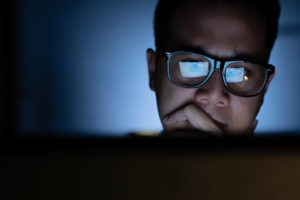 The COVID-19 virus has made fundamental changes to the way people live their lives. Folks are spending more time indoors; existing anxieties are heightened, and everyone is trying to find information about when we may regain some semblance of a normal life.
The COVID-19 virus has made fundamental changes to the way people live their lives. Folks are spending more time indoors; existing anxieties are heightened, and everyone is trying to find information about when we may regain some semblance of a normal life.
To help, many have been turning to screens more than they normally would. Television, computers, smartphones, and tablet screens have been the only connection to the outside world for many, and screen time is undoubtedly rising.
Advertisement
But it could have a major unintended consequence: poor sleep caused by blue light.
It’s not just the gloomy news and conversations that are causing anxiety to keep you awake. The light that emanates from these devices can influence your circadian rhythm, making it harder to fall asleep.
Being tired isn’t the only drawback of less sleep. It might increase your risk factors for the coronavirus.
Less sleep is associated with high blood pressure, high blood sugar, obesity, and heart disease. All of these conditions can bump your risk for COVID-19. There is research to suggest that blue lights, like those found in your screens, can mess with your body’s natural sleep/wake cycle.
Research has shown that exposure to blue light for extended periods, particularly at night, can suppress melatonin secretion and disrupt circadian rhythm. One study showed that participants exposed to blue light had melatonin suppressed at twice the rate of those exposed to green light.
Further, their circadian rhythm shifted by three hours instead of the 1.5-hour shift experienced by the group exposed to green light. Other research has found that wearing blue-light-blocking goggles can negate the effects of these stimulating lights.
Blue light can be useful in the daytime. It can boost mood and energy while making you more productive. But once the sun starts to go down, they can impede melatonin secretion and sleep.
Most smartphones and tablets are now included with options that can limit blue light exposure. All you have to do is set a time for it to kick in and your screen will produce dimmer light wavelengths. My light filter, for example, kicks in at 5 PM each day.
Advertisement
Another way to protect yourself from too much blue light exposure at night is to stop looking at screens about three hours before bed. Instead, use the time to read, relax, chat with a friend, or do another non-screen activity.
Using dim lights, like a red light or a candle, can also help you stay on track with your body’s natural cycles.
Lastly, getting outside during the day, particularly in the morning, can boost your ability to sleep at night. Exposing yourself to natural light might be one of the best sleep aids available.
